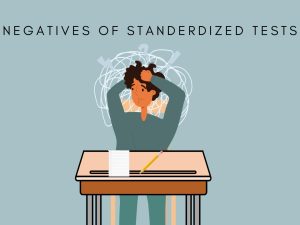The GPA Killer: Final Exams
Impending finals are prominent causes of stress.
May 9, 2016
There is nothing better than a long and treacherous week of final exams after an even longer semester of learning. It is just wonderful how the education system works, with much of of a student’s final grade riding on one single test, covering age-old information they rid their minds of long ago. Not only do these tests unjustly alter a student’s final grade, but they also affect students’ chances of getting into college, during a time in which acceptance has become more out of reach than ever. Worrying about all these factors only causes stress, a burden on young minds everywhere. This stress often spirals into desperation, causing students to make rash decisions including cheating on tests, as well as in simply giving up.
Final exams are a prevalent stress inducer in this day and age, and people have yet to discover how they benefit students as a whole.
Acceptance rates are declining for many top colleges that NC students are interested in pursuing. Currently, Duke University accepts a mere 13.4% of its applicants, University of North Carolina at Chapel Hill accepts 27.6% of its applicants, and Wake Forest University accepts 35.2% of its applicants. These declining rates have caused increased competition between students and their peers, knowing that if they fall behind, they won’t be a part of the percentage accepted. That being said, this kind of stress on a student can greatly affect how well their brain is able to perform.
A point often overlooked is how much final exams can alter a student’s grade. Even if they possess a well deserved A in a class, doing poorly on a final exam can easily drop that to a C or even a D. With this in mind, many wonder why students don’t simply study intensely in order to secure them a solid A in a class. This is a wonderful idea until you’re actually in the shoes of a struggling high schooler.
Classes often go like this: memorize information, regurgitate onto a test, repeat. Students are constantly purging their minds of unneeded information in order to make room for all the new material to come. After five consecutive months of this cycle, it is extremely difficult to accurately remember every bit of information learned. Not remembering information leads to more studying, more studying leads to cramming, cramming leads to stress, and stress leads to taking alternate measures, which often include cheating or giving up entirely. Under those circumstances, finals testing gets hairy.
Teachers frequently point out how stressed their students are. No, stress doesn’t keep students busy, and no stress is not healthy for their minds. There is such a thing as healthy stress, but it comes in short bursts and often aids in motivating people to get their work done and achieve their goals. This kind of stress isn’t what students are suffering from. Many suffer from stress that is detrimental to their health, often caused by a heavy school workload as well as other responsibilities and activities they participate in. Undoubtedly, this unhealthy stress impedes on a person’s ability to get the most out of the education provided for them.
Given these points, it is not difficult to understand how negatively final exams can affect a student’s stress levels, as well as their success levels. There are definitely alternate routes the education system could take to simultaneously challenge and test a student’s knowledge on a course that would be kinder to their final grade. For instance, schools could require students to complete a final project or essay at the end of a semester to sum up what they learned, which would at least give them a chance to do well without memorizing every piece of information. High school is difficult enough without final exams, why shouldn’t students catch a break after giving school our all for months on end?








